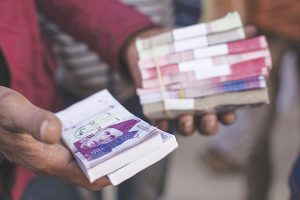Bloomberg
Pakistan’s rupee slumped to a fresh record ahead of a visit by the International Monetary Fund (IMF) team for negotiations over the resumption of its $6.5 billion bailout program.
The rupee fell for a sixth straight day, according to data compiled by Bloomberg. It traded as low as 269 per dollar on Monday, according to the foreign-exchange desk at AKD Securities Ltd. A team from the Washington-based multilateral lender is set to arrive Tuesday for a review after months of delay over the next loan tranche.
Pakistan is spiraling deeper into crisis amid a shortage of dollars and accelerating inflation, increasing the urgency for Prime Minister Shehbaz Sharif to secure funds from the IMF. Authorities have eased control on the currency and raised fuel prices, among the IMF conditions for the loan.
In Pakistan, the rupee’s slide this month was triggered by the decision of money exchange companies to abolish the limit on the dollar-rupee rate in the open market.
Supply of dollars among onshore money-changing businesses has dried up as locals turned to the black market, as the greenback was being sold at about 10% above advertised rates.
“The rupee will soon stabilize,†said Mohammed Sohail, chief executive at Topline Securities Ltd. in Karachi. “All depends on the IMF team visit and their reaction. We are hearing that exporters have withheld billions of dollars that may also come in.â€
Calculations by Bloomberg Economics show the rupee should stabilise at 266 per dollar, according to a note on Monday by Ankur Shukla, an analyst in Mumbai.
A tough task lies ahead for the nation’s economic managers led by Finance Minister Ishaq Dar, who will need to convince the IMF that the country is ready to implement tough measures including raising taxes. Sharif has said his coalition government is determined to complete the bailout plan even though it will have to pay a political cost for the decision just months away from national elections.
Frontier markets seeking IMF financing are facing greater pressure to loosen their grip on currencies, a move which will help improve their current-account balances. Egypt this month suffered its third devaluation in less than a year.
In Pakistan, the rupee’s slide this month was triggered by the decision of money exchange companies to abolish the limit on the dollar-rupee rate in the open market. Supply of dollars among onshore money-changing businesses has dried up as locals turned to the black market, as the greenback was being sold at about 10% above advertised rates.
 The Gulf Time Newspaper One of the finest business newspapers in the UAE brought to you by our professional writers and editors.
The Gulf Time Newspaper One of the finest business newspapers in the UAE brought to you by our professional writers and editors.
